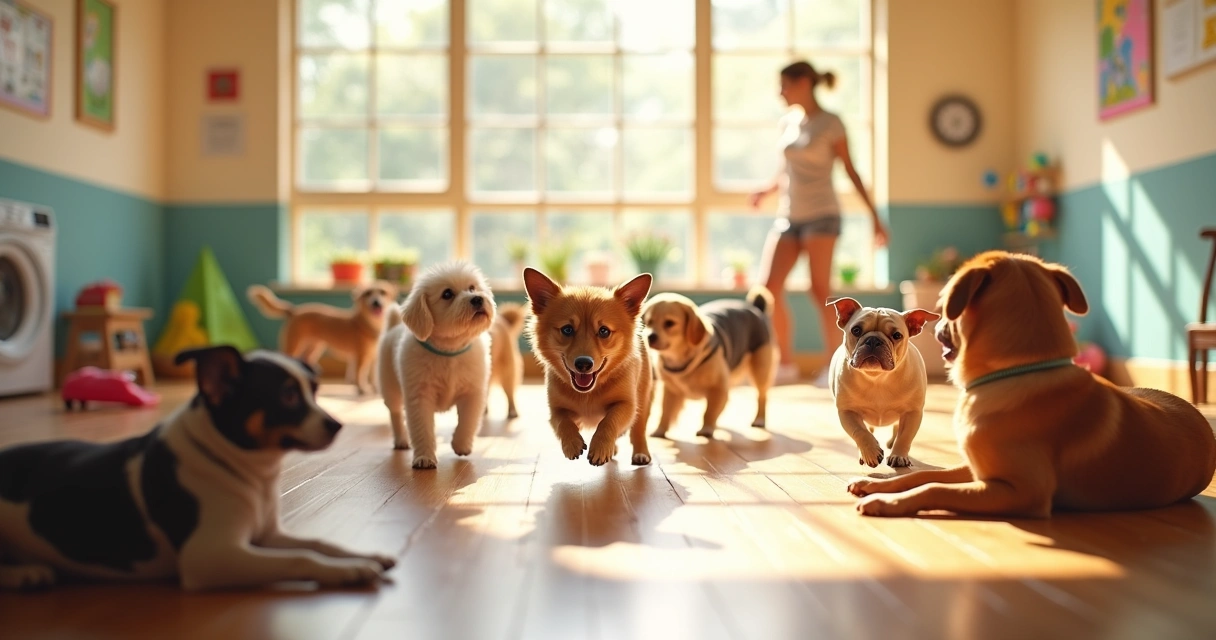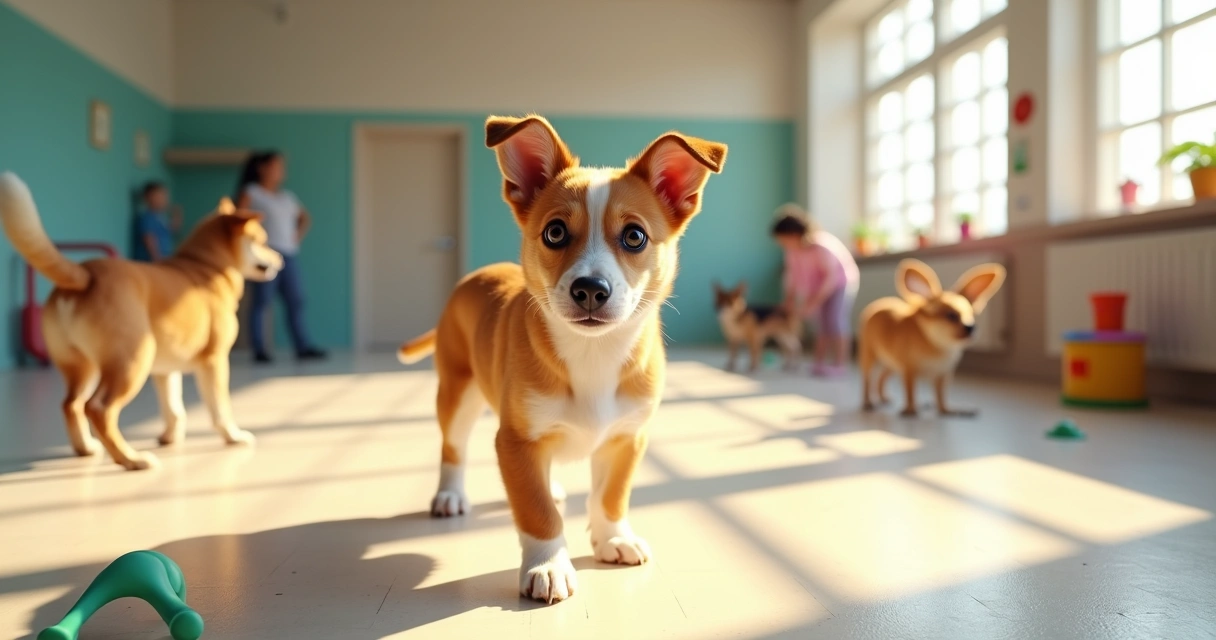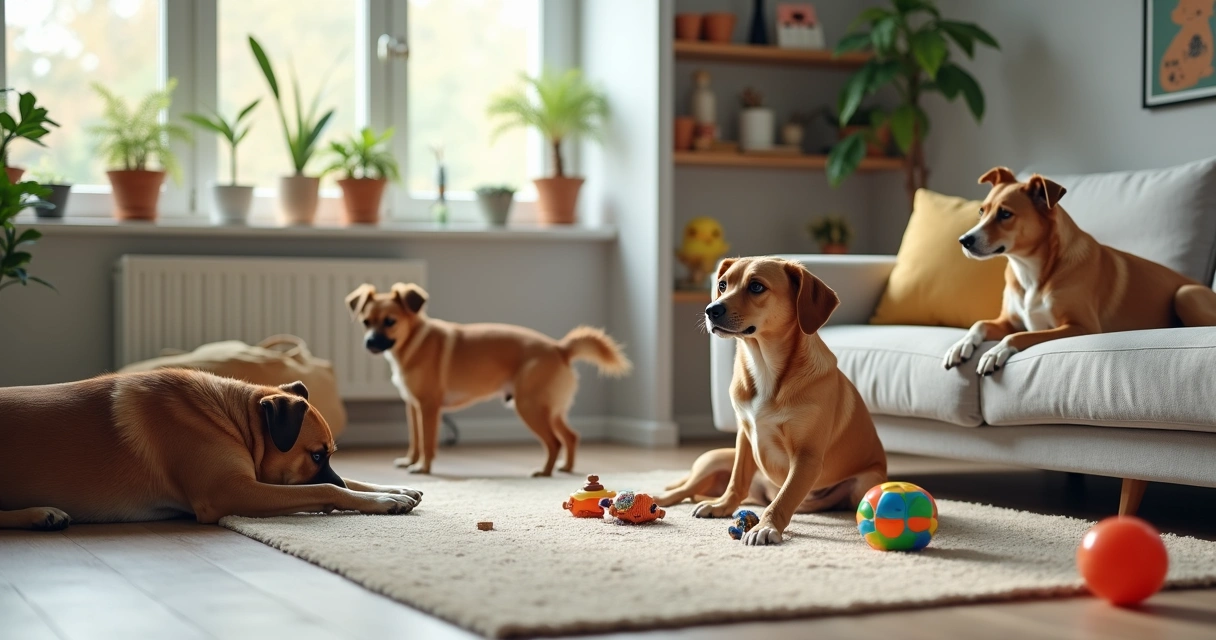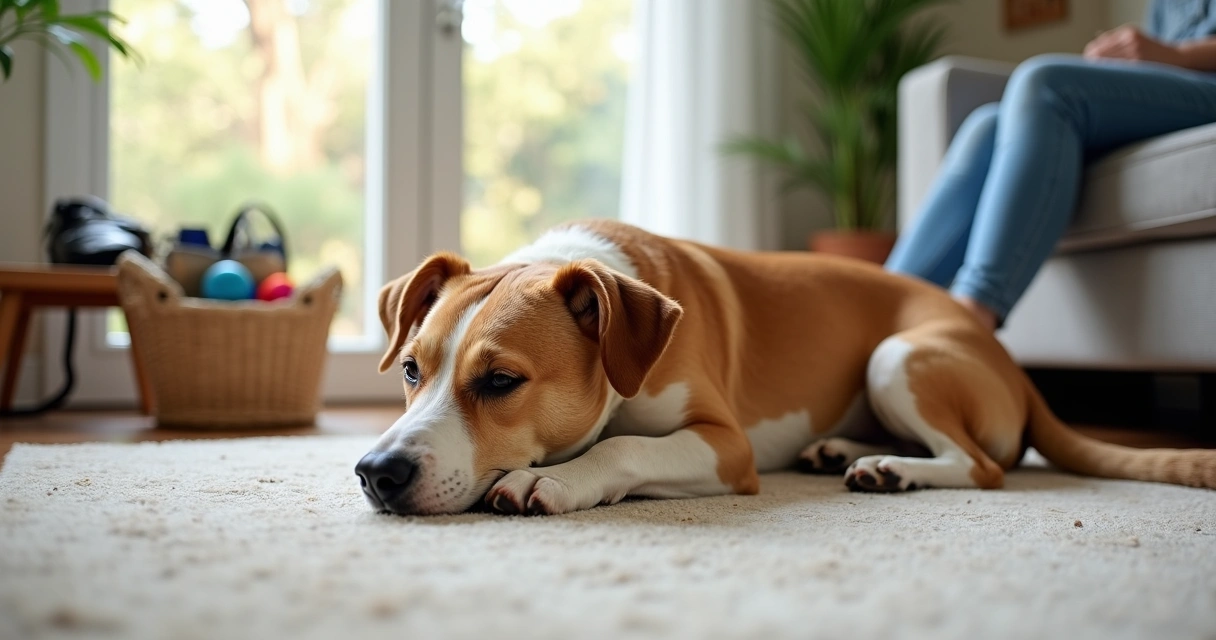You drop your dog off for a day of play and care, expecting a tired but happy friend at pickup. But sometimes, your pup greets you with wild eyes, frantic energy, or maybe just shuts down and seems distant. What does it mean when daycare leaves your dog feeling “too much”? Overstimulation at daycare is more common than most people think.
Why stimulation matters for dogs
Like us, dogs need both company and downtime. Daycare provides a busy, lively environment that can be wonderful for many dogs, especially those who love play and interaction. But busy doesn’t always mean better. A bustling group of dogs, lots of noises, new smells, and new friends can cross that invisible limit where excitement starts to feel overwhelming.
Dogtown in Gloucester, MA, sets itself apart by focusing on tailored group sizes and considerate supervision, always matching play styles and energy levels to ensure dogs socialize in a healthy, happy way. But even in the best facilities, overstimulation can happen—especially for sensitive or high-energy pups (or for those who just have an off day).
Watch for the signs—your dog’s telling you what words can’t.
What does overstimulation look like?
Recognizing when your dog might be overloaded is key to helping them enjoy daycare as much as possible. Overstimulation doesn’t always look dramatic; in fact, the signs can be surprisingly subtle.
- Pacing or restlessness. Instead of settling into a group, your dog might wander or circle anxiously.
- Barking or whining constantly. A little noise is normal in dog groups, but constant, uncharacteristic vocalizing can be a red flag.
- Unusually rough play. Play moves from gentle to chaotic—nipping, tackled too hard, wrestling that doesn’t stop when asked.
- Jumping on staff or trying to escape. Dogs might seek comfort but, instead, become clingy or even try to avoid the group.
- Pausing and 'shutting down'. Sometimes, the opposite happens. Your dog freezes, moves away, or finds a quiet spot to hide.
- Compulsive licking, shaking, or yawning. Dogs self-soothe through these behaviors, often a sign they need a break.
- Ignoring food or treats. Even the hungriest pups may refuse snacks if their bodies are in overdrive.
It’s not always just one sign; sometimes, it sneaks up as a mix of these behaviors, or just a general sense that your dog is “not themselves.”

Why does overstimulation happen at daycare?
There are many reasons a dog can get overwhelmed in group care. Awareness helps dog owners and staff alike to adjust routines or supports where needed.
- Group size and energy. Even at Dogtown, where staff pay close attention to groupings, a mismatch of energy or personality can tire out sensitive pups.
- New experiences and smells. Daycare is full of strange scents, new friends, new toys. For a cautious dog, each new thing adds up.
- Change in routine. Dogs are natural creatures of habit. A different play schedule or being introduced to new dogs can rattle them.
- Too much excitement, no downtime. While Dogtown’s daycare program schedules regular rest, some dogs struggle to self-regulate, getting caught up in the excitement.
- Noise and commotion. Barking, toys squeaking, leashes clinking—this all stimulates the senses and, for some dogs, becomes a flood.
Most dogs benefit from daycare, but those with anxiety, trauma history, or certain medical conditions might find it harder to cope. That’s why Dogtown’s day camp and personalized training services work hand-in-hand, creating smoother transitions and extra support for sensitive dogs.
How to help your dog if they're overstimulated
If you think your furry friend leaves daycare looking frazzled or comes home acting in strange ways, don’t panic. There are steps to help manage and avoid overstimulation.
- Talk with staff. At Dogtown, daily reports are part of the service. If you notice signs of stress, ask detailed questions about your dog's day—energy, group dynamics, rests, and favorite activities.
- Introduce slowly. New to daycare? Start with short, half-days or alternate days to help your dog build confidence and resilience over time.
- Advocate for breaks. Downtime is key. Quality daycare, like Dogtown, schedules nap times and calm moments for each dog, but every dog is different—some need more quiet than others.
- Mix it up with training. Enroll in training sessions that teach impulse control, calm responses, or simply reinforce familiar cues. Training helps dogs learn how to cope in busy settings.
- Monitor at home. After a daycare day, provide a quiet environment and resist the urge for extra play. Some dogs will sleep for hours, while others need gentle reassurance.
- Consider special services. If grooming or boarding is also part of your routine, let staff know if your pet has had a hard day. The team can adjust care during grooming or overnights to lower stimulation.
Underlying health or behavioral issues can also show up first at daycare. Regular feedback and a partnership with caretakers, like the team at Dogtown, leads to happier experiences for everyone.
Pre-enrollment and assessment: the first line of defense
One thing that sets Dogtown apart is their free pre-enrollment assessment. This isn’t just a formality; it’s a safety net for your dog's well-being. The staff carefully evaluates each dog, looking at play style, comfort with strangers, and social boundaries. This helps prevent issues before they start.
Assess first, play safer.
Owners also benefit—getting peace of mind that the care team understands their dog’s quirks and needs from day one.
When to be concerned—and what to do next
Occasional overstimulation can happen to any dog, but if you see repeated stress, changes in behavior, or ongoing issues at pick-up, it’s worth reevaluating. Sometimes all your dog needs is a little less group play, a chance to build coping skills, or just a slower introduction.
Facilities like Dogtown are happy to work with you, adapting programs and routines as needed. Whether it’s adjusting group sizes or suggesting rest days, open communication goes a long way. And if you’re still worried, a chat with your vet can uncover any underlying issues making stimulation tough for your pup.

Final thoughts: caring beyond the daycare day
Every dog is unique. Tailored care, close communication, and a little patience offer the best path to stress-free socialization and fun.
More joy, fewer jitters.
If you want your dog’s daycare days to bring happiness and growth, schedule a free pre-enrollment assessment with us at Dogtown. Discover what quality care in Gloucester can mean for your best friend—and yourself.
Frequently asked questions
What is overstimulation in dogs?
Overstimulation in dogs happens when their senses or emotions get flooded by too much excitement, noise, activity, or new experiences. It means they are no longer able to relax, listen, or self-calm. This can show up as hyperactive behavior, anxious reactions, or even shutting down.
How to spot an overstimulated dog?
Look for restless pacing, constant barking, rough play that doesn’t settle, hiding from the group, ignoring food, or physical signs like shaking and yawning. If your dog comes home from daycare acting wild, withdrawn, or very different from their usual self, overstimulation might be the cause.
What causes overstimulation at daycare?
Overstimulation at daycare often comes from big groups, lots of new sights and smells, sudden changes in routine, and very loud or fast environments. Sensitive dogs or those not used to group play are usually more affected. Facilities that carefully match dogs by size and temperament, such as Dogtown, can help reduce this risk.
How can I calm my dog down?
Provide a quiet, comfortable place at home and let your dog rest after daycare. Avoid extra play or stimulation for a while. Calm petting, gentle routines, and familiar toys can help. Working with the daycare team to schedule more breaks, shorter days, or additional training may also help your dog learn coping skills.
Is dog daycare safe for all dogs?
Dog daycare is generally safe when the facility evaluates each dog’s needs and personality. Not every dog is a perfect fit for large, busy groups. Some need small play circles, quiet rest areas, or extra staff support. At Dogtown, thorough assessments help ensure all pets enjoy safe, happy, and personalized experiences.





